
Collect, manage, and structure quantitative datasets. Conceptualize suitable empirical methodologies and models. Work closely with the Faculty Director, Research Director/Manager, data scientists, and teams of fellows and students to drive forward a diverse research program focused on machine learning and policy evaluation. Some of our partners include the Environmental Protection Agency (EPA), the Internal Revenue Service (IRS), the Department of Labor (DOL), and various public interest organizations.Īs a member of our research team, you will: We are an interdisciplinary team of data scientists, social scientists, engineers, and lawyers who are passionate about building high-impact demonstration projects for the future of governance. Ībout Us: Stanford RegLab is an impact lab that partners with government and nonprofits to use machine learning and data science to modernize the public sector. In recent years, fellows have been coauthors on RegLab publications for PNAS, JAMA Health Forum, Nature Sustainability, the American Economic Journal: Economic Policy, the American Law and Economics Review, the Journal of Law, Economics, and Organization, ACM FAccT, the Journal of Empirical Legal Studies, and the Stanford Law Review. Prior Research Fellows have been accepted by PhD programs in computer science, economics, and political science and JD programs at top schools (e.g., Harvard, Stanford, Princeton, Yale). This position is a great next step for those considering graduate school, law school, and/or business school in the future. This is a minimum one-year position, with the option of renewal. The Speculum Theologiae: A collaborative project created by Yale undergraduate students in the 2006 Medieval Studies seminar “The Medieval World of Umberto Eco’s Name of the Rose.The Regulation, Evaluation, and Governance Lab (RegLab) at Stanford University is hiring full-time pre-doctoral Research Fellows to join our research team. ExhibitionsĪ Book of Her Own: Based on a 2006 exhibition that explores books owned by women before the year 1700. To browse Yale’s holdings of incunables, follow these directions on the Yale Library’s Help page. Records for these can be found in Orbis, the Yale University Library’s online catalog. 
In addition to its manuscript holdings, the Beinecke Library holds extensive collections of incunabula, or early printed books. Images can be searched by way of the “Search within this collection” box on the upper-left corner of this page and through the Library’s Digital Images database. The Beinecke Library is actively scanning its medieval and Renaissance holdings. The Medieval & Renaissance Manuscripts Catalog also contains records for manuscripts in the Mellon Alchemical Collection as well as short descriptions of manuscripts acquired by the Library since the publication of the Catalogue of Medieval and Renaissance Manuscripts. Commonly used abbreviations are available here (pdf, 5 p.) and the Introduction, by Barbara Shailor, can be downloaded here (pdf, 8 p.). The full-text of these catalogues can be searched in the Medieval & Renaissance Manuscripts Catalog. The manuscript collections have been described extensively in the Catalogue of Medieval and Renaissance Manuscripts in the Beinecke Rare Book and Manuscript Library, Yale University, volumes 1-3 of which were edited by Barbara Shailor, and volume 4 of which was edited by Robert Babcock, Lisa Davis, and Philip Rusche. The systematic collecting of medieval manuscripts at Yale, however, dates from the late nineteenth century, and the most active period for collecting was after 1930.

An illustrated copy of the Speculum humanae salvationis, it attracted the special attention of Yale President Ezra Stiles, who read the manuscript and annotated it in the 1790s.

The first medieval manuscript recorded in the Yale collection was acquired in 1714, and was the gift of Elihu Yale. The Beinecke Library’s Medieval and Renaissance collections document the history of human thought from the Byzantine era through 1600.







 0 kommentar(er)
0 kommentar(er)
